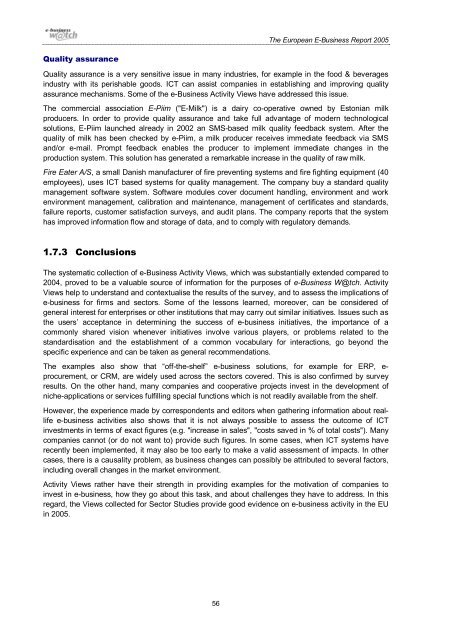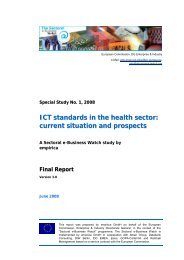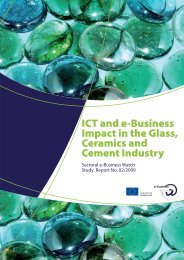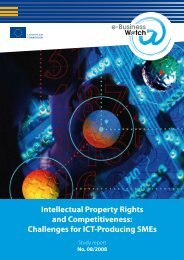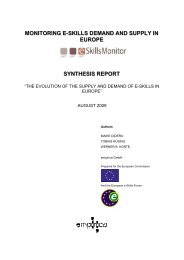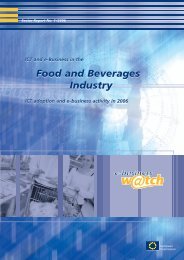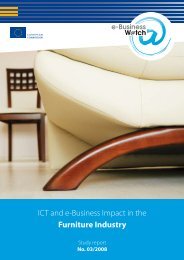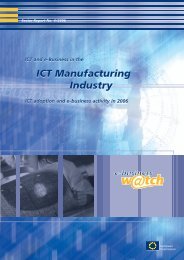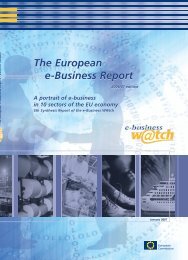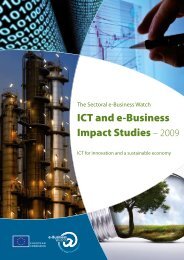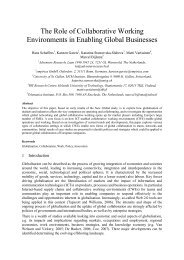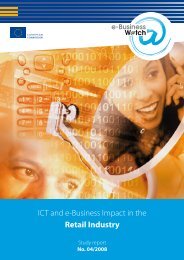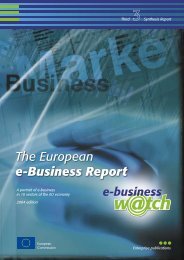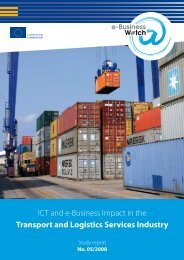The European e-Business Report The European e ... - empirica
The European e-Business Report The European e ... - empirica
The European e-Business Report The European e ... - empirica
Create successful ePaper yourself
Turn your PDF publications into a flip-book with our unique Google optimized e-Paper software.
<strong>The</strong> <strong>European</strong> E-<strong>Business</strong> <strong>Report</strong> 2005<br />
Quality assurance<br />
Quality assurance is a very sensitive issue in many industries, for example in the food & beverages<br />
industry with its perishable goods. ICT can assist companies in establishing and improving quality<br />
assurance mechanisms. Some of the e-<strong>Business</strong> Activity Views have addressed this issue.<br />
<strong>The</strong> commercial association E-Piim ("E-Milk") is a dairy co-operative owned by Estonian milk<br />
producers. In order to provide quality assurance and take full advantage of modern technological<br />
solutions, E-Piim launched already in 2002 an SMS-based milk quality feedback system. After the<br />
quality of milk has been checked by e-Piim, a milk producer receives immediate feedback via SMS<br />
and/or e-mail. Prompt feedback enables the producer to implement immediate changes in the<br />
production system. This solution has generated a remarkable increase in the quality of raw milk.<br />
Fire Eater A/S, a small Danish manufacturer of fire preventing systems and fire fighting equipment (40<br />
employees), uses ICT based systems for quality management. <strong>The</strong> company buy a standard quality<br />
management software system. Software modules cover document handling, environment and work<br />
environment management, calibration and maintenance, management of certificates and standards,<br />
failure reports, customer satisfaction surveys, and audit plans. <strong>The</strong> company reports that the system<br />
has improved information flow and storage of data, and to comply with regulatory demands.<br />
1.7.3 Conclusions<br />
<strong>The</strong> systematic collection of e-<strong>Business</strong> Activity Views, which was substantially extended compared to<br />
2004, proved to be a valuable source of information for the purposes of e-<strong>Business</strong> W@tch. Activity<br />
Views help to understand and contextualise the results of the survey, and to assess the implications of<br />
e-business for firms and sectors. Some of the lessons learned, moreover, can be considered of<br />
general interest for enterprises or other institutions that may carry out similar initiatives. Issues such as<br />
the users’ acceptance in determining the success of e-business initiatives, the importance of a<br />
commonly shared vision whenever initiatives involve various players, or problems related to the<br />
standardisation and the establishment of a common vocabulary for interactions, go beyond the<br />
specific experience and can be taken as general recommendations.<br />
<strong>The</strong> examples also show that “off-the-shelf” e-business solutions, for example for ERP, e-<br />
procurement, or CRM, are widely used across the sectors covered. This is also confirmed by survey<br />
results. On the other hand, many companies and cooperative projects invest in the development of<br />
niche-applications or services fulfilling special functions which is not readily available from the shelf.<br />
However, the experience made by correspondents and editors when gathering information about reallife<br />
e-business activities also shows that it is not always possible to assess the outcome of ICT<br />
investments in terms of exact figures (e.g. "increase in sales", "costs saved in % of total costs"). Many<br />
companies cannot (or do not want to) provide such figures. In some cases, when ICT systems have<br />
recently been implemented, it may also be too early to make a valid assessment of impacts. In other<br />
cases, there is a causality problem, as business changes can possibly be attributed to several factors,<br />
including overall changes in the market environment.<br />
Activity Views rather have their strength in providing examples for the motivation of companies to<br />
invest in e-business, how they go about this task, and about challenges they have to address. In this<br />
regard, the Views collected for Sector Studies provide good evidence on e-business activity in the EU<br />
in 2005.<br />
56


